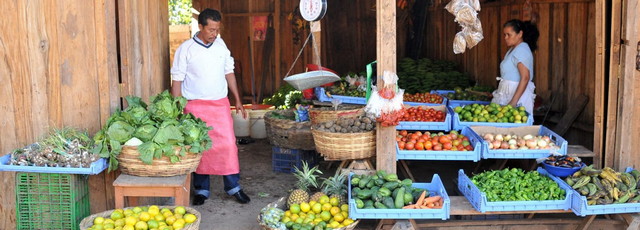By Carolyn Baker
“We are being ranched,” says Michael Brownlee, and what is more, most of us are living in one kind of food desert or another.
In this book, author Michael Brownlee is inciting a local food revolution, and this revolution is far more expansive, far more radical, and far more life-altering than creating a few farmers markets and promoting one’s local economy. According to Brownlee, our industrial food system “has itself become the greatest threat to humanity’s being able to feed itself.” However, this revolution is not merely an uprising against the global industrial food system but also a “coming together to build something new in the face of nearly impossible odds.” In fact, it is a spiritual, as well as a social and political event because it will require us to learn how to feed ourselves. What is more, it is a “center of aliveness in the midst of a dying civilization” which “provides more than hope; it is a revolution of the deeper meaning and purpose and presence that lie ahead, emerging mysteriously out of a convergence of seed, soil, soul, and stars.” The Unholy Alliance—Big Food, Big Ag, and Big Pharma, empowered by Big Banking and Big Government has deprived us of the autonomy of learning how to feed ourselves and has also convinced farmers, entrepreneurs, and investors that solutions for feeding the world are technological only.
In other words, in the local food revolution that must happen, “we are not attempting to change or fix the global industrial food system. We’re simply putting all our efforts into building our own food system, our own regional foodsheds.” According to Brownlee, we must “resign as consumers” and opt out of the global food system which is what the Unholy Alliance fears most: Losing control of our food supply, but more fundamentally, losing control of us.
The author has been aware of the collapse of industrial civilization for nearly two decades, and he has witnessed a number of revolutions coming and going, but he asserts that “real revolutions are called into being.” Called into being by what? According to Brownlee, “…by something greater than ourselves.”
If this declaration brings to mind the word “sacred,” that’s because “sacred” is exactly what the author has in mind. “Food is sacred,” he says, and “We need to make eating sacramental again and come to regard farming and ranching, along with preparing and cooking food, nothing less than a spiritual practice.”
Brownlee takes us through the watershed moments of our human development: The Agricultural Age, the Industrial Age, the Information Age, and the Anthropocene, but he does not stop there. Drawing on the wisdom of geo-logian, Thomas Berry, and physicist, Brian Swimme, who have written volumes about the notion of partnership between humanity and the Earth community, the author hypothesizes that this might lead to humanity devoting itself to repairing the destruction it has inflicted on the planet. Such a partnership could, in turn, lead to a greater community era in which “we may then emerge into a realm of life that goes far beyond our planetary sphere.”
The alternative, of course, is human extinction. For Brownlee, the realization that we are now facing impending catastrophic climate change has been life-changing in the way that near-death experiences often are. He notes that abrupt climate change is giving humanity a near-death experience that may provide, as such experiences often do, an entirely new outlook on life. Part of this new outlook for the author has been his countless epiphanies with regard to food and the possibility of an emerging food revolution. Such a revolution could not have occurred in the context of business as usual but rather, as Brownlee states, “the food revolution manifesting around local food can occur only at the moment of the death of a civilization…in the same way that the supernova process is possible only with the death of a star.”
Throughout The Local Food Revolution, the author uses the word foodshed, which simply refers to the geographic region that produces food for the population in that area. A student of the work of Christopher Alexander and his pattern language theory, Michael Brownlee suggests that “we can see that a pattern language for food localization could be about discovering the inherent patterns that bring aliveness, wholeness, and healing to our foodsheds—and our communities. This is an extremely potent development.”
The fundamental pattern to which Brownlee is ultimately referring is the pattern of relationships. “The essence of all the patterns presented here is relationship, relationships of a particular quality. What is emerging is a web of relationships that forms the underlying structure of an emerging foodshed…Perhaps the reason that local food work is so attractive and engaging—and so satisfying,” says the author, “is that it is really about recovering our very humanity and all else that has been lost with the rise of industrial civilization.”
In a chapter entitled, “The Secrets of Co-Creative Collaboration,” Brownlee lays out a detailed strategy for a local food revolution which advances from one individual waking up to our predicament, through the establishment of collaborative community resilience and self-reliance. The Local Food Revolution does not propose “a few easy” steps to creating this resilience and self-reliance, but offers a hands-on strategy for fully inhabiting our foodsheds, including a stunning “Local Food Declaration of Independence” that is certain to warm the heart and also challenge the assumptions instilled in us by the Unholy Alliance.
The Local Food Revolution is no-nonsense reading that is at once profoundly practical and wildly inspiring. I’d be willing to bet that after reading it, your relationship with food will never be the same.
Carolyn Baker, Ph.D., was an adjunct professor of history and psychology for 11 years and a psychotherapist in private practice for 17 years.
17 October 2016

